Related Research Articles

Agent Orange is a chemical herbicide and defoliant, one of the tactical use Rainbow Herbicides.

The Vietnam War was a conflict in Vietnam, Laos, and Cambodia from 1 November 1955 to the fall of Saigon on 30 April 1975. It was the second of the Indochina Wars and a major conflict of the Cold War. While the war was officially fought between North Vietnam and South Vietnam, the north was supported by the Soviet Union, China, and other communist states, while the south was supported by the US and anti-communist allies. This made it a proxy war between the US and Soviet Union. It lasted almost 20 years, with direct US military involvement ending in 1973. The conflict spilled into the Laotian and Cambodian civil wars, which ended with all three countries becoming communist in 1975.
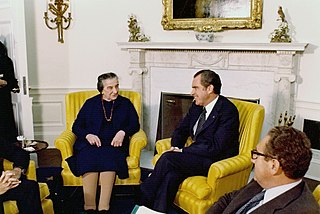
The Nixon Doctrine was the foreign policy doctrine of Richard Nixon, the 37th president of the United States from 1969 to 1974. It was put forth during a press conference in Guam on July 25, 1969, by Nixon, and later formalized in his speech on Vietnamization on November 3, 1969.

Operation Paperclip was a secret United States intelligence program in which more than 1,600 German scientists, engineers, and technicians were taken from the former Nazi Germany to the U.S. for government employment after the end of World War II in Europe, between 1945–59. Some were former members and leaders of the Nazi Party.
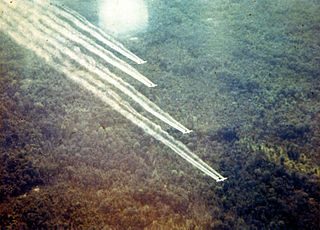
Operation Ranch Hand was a U.S. military operation during the Vietnam War, lasting from 1962 until 1971. Largely inspired by the British use of chemicals 2,4,5-T and 2,4-D during the Malayan Emergency in the 1950s, it was part of the overall herbicidal warfare program during the war called "Operation Trail Dust". Ranch Hand involved spraying an estimated 19 million U.S. gallons (72,000 m3) of defoliants and herbicides over rural areas of South Vietnam in an attempt to deprive the Viet Cong of food and vegetation cover. Areas of Laos and Cambodia were also sprayed to a lesser extent. According to the Vietnamese government, the chemicals caused 400,000 deaths. The United States government has described these figures as unreliable.
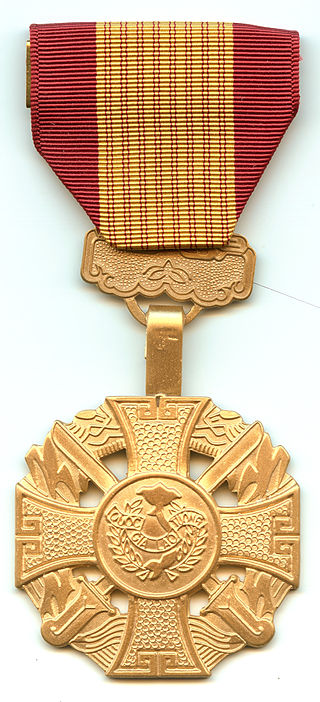
The Republic of Vietnam Gallantry Cross also known as the Vietnamese Gallantry Cross or Vietnam Cross of Gallantry is a military decoration of the former Government of South Vietnam. The medal was created on August 15, 1950, and was awarded to military personnel, civilians, and Armed Forces units and organizations in recognition of deeds of valor or heroic conduct while in combat with the enemy.
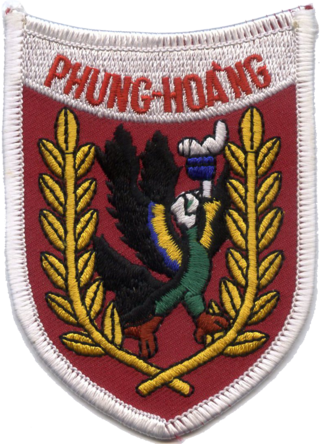
The Phoenix Program was designed and initially coordinated by the United States Central Intelligence Agency (CIA) during the Vietnam War, involving the American, Australian, and South Vietnamese militaries. In 1970, CIA responsibility was phased out, and the program was put under the authority of the Civil Operations and Revolutionary Development Support (CORDS).

Operation Sealords was a military operation that took place during the Vietnam War.

Estimates of casualties of the Vietnam War vary widely. Estimates can include both civilian and military deaths in North and South Vietnam, Laos, and Cambodia.
The following outline is provided as an overview of and topical guide to the Vietnam War:
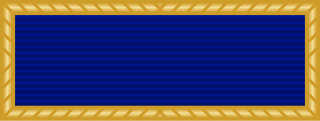
The Presidential Unit Citation (PUC), originally called the Distinguished Unit Citation, is awarded to units of the uniformed services of the United States, and those of allied countries, for extraordinary heroism in action against an armed enemy on or after 7 December 1941. The unit must display such gallantry, determination, and esprit de corps in accomplishing its mission under extremely difficult and hazardous conditions so as to set it apart from and above other units participating in the same campaign.
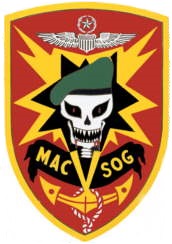
Military Assistance Command, Vietnam – Studies and Observations Group (MACV-SOG) was a highly classified, multi-service United States special operations unit which conducted covert unconventional warfare operations before and during the Vietnam War.

The Military Intelligence Corps is the intelligence branch of the United States Army. The primary mission of military intelligence in the U.S. Army is to provide timely, relevant, accurate, and synchronized intelligence and electronic warfare support to tactical, operational and strategic-level commanders. The Army's intelligence components produce intelligence both for Army use and for sharing across the national intelligence community.

The term military medicine has a number of potential connotations. It may mean:

Alexander Demitri "Alex" Shimkin was an American war correspondent who was killed in the Vietnam War. He is notable for his investigation of non-combatant casualties in Operation Speedy Express.
Operation Chicago Peak was a joint U.S. Army and Army of the Republic of Vietnam (ARVN) military operation during the Vietnam War designed to keep pressure on the People's Army of Vietnam (PAVN) units in the A Sầu Valley and prevent them from mounting any attacks on the neighboring coastal provinces.
References
- Edwin E. Moïse (1996), Tonkin Gulf and the escalation of the Vietnam War, 304 pages
- Lewis Sorley (2007), A Better War, 528 pages
- Institute Of Medicine, Institute of Medicine (U.S.), National Academies Press (U.S.) (2007), Veterans and agent orange, 871 pages
- John M. Carland (2000), Combat Operations, 430 pages
- Marvin E. Gettleman (1995), Vietnam and America, 560 pages
- William Rosenau (2001), Special operations forces and elusive enemy ground targets, 60 pages
- Lyndon Baines Johnson (1971), The vantage point, 636 pages
- Mike McKinney (2003), Chariots of the Damned, 256 pages